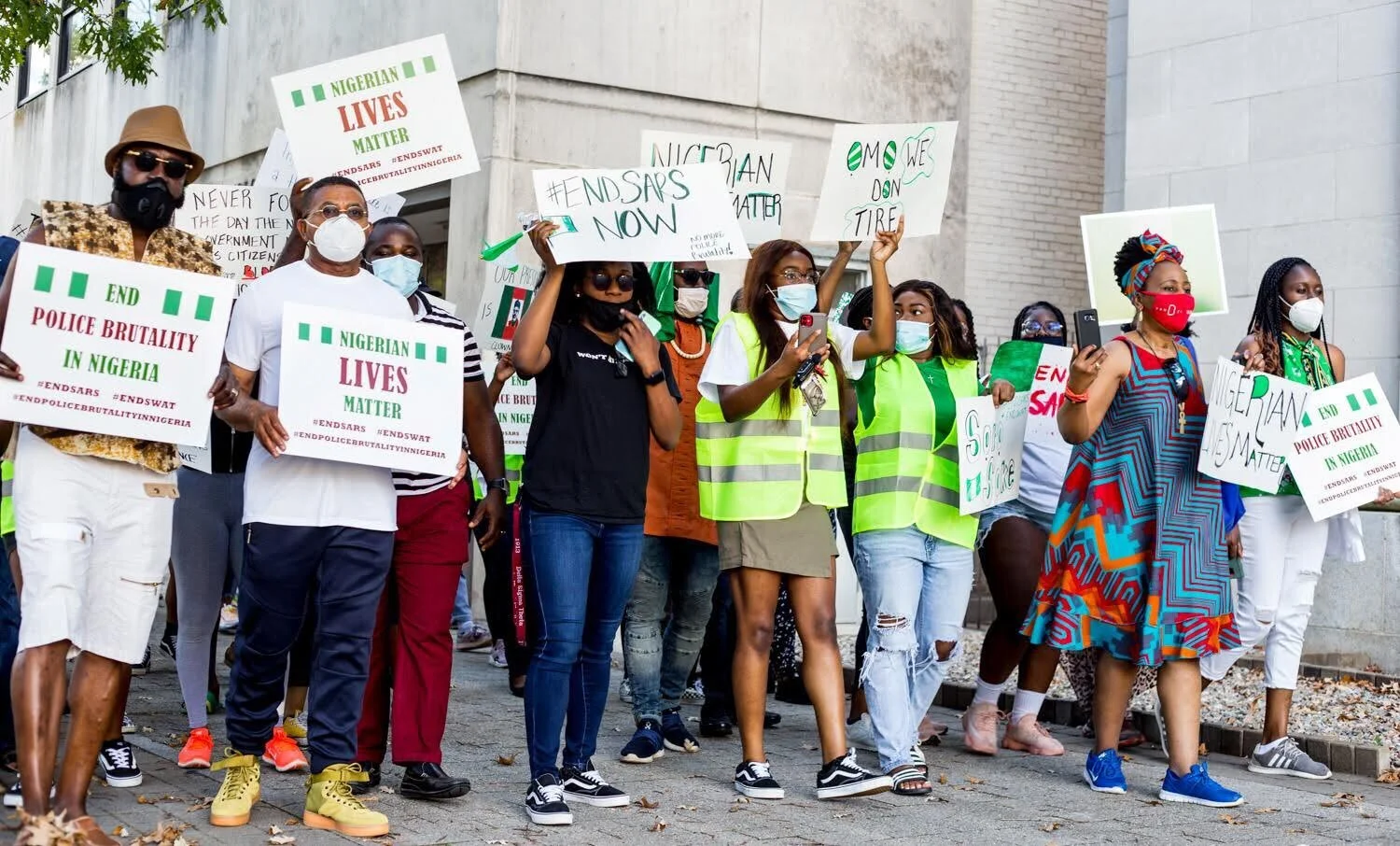#ENDSARS: African Youth in Diaspora Respond to Police Brutality with Protest in Raleigh
In response to police violence enforced by the Special Anti-Robbery Squad in Nigeria, Nigerians in the Triangle held a #ProtestForAfrica in downtown Raleigh on October 24, mobilizing African youth.
Created in 1992, SARS is a unit of the Nigerian Police Force that has been known to unlawfully extort, bribe, and assault Nigerians. There have been calls to disband the unit since 2017, with the #ENDSARS movement coming to a head when police killed protesters at the Lekki Toll Gate on October 20.
Nigerians are the largest African diaspora group in the United States and in the Raleigh-Durham-Chapel Hill Triangle alone, the community of over 1,000 people is steadily growing. Raised in Abia State, Nigeria for 14 years, 20-year-old Nkemdi Amarachi Obi knew she had to do something.
“It all started with an argument at my house where I was talking to someone about how we need to go down to Atlanta and protest,” said Obi, the vice president of North Carolina State University’s African Student Union. “They said, ‘What's that going to do here? Atlanta already has their stuff going on.’ So I made a couple of phone calls to start getting permits, talking to people, and doing the logistical work.”
Image courtesy of Twitter
UNC-Chapel Hill junior Chiazo Agina found out about the protest from a GroupMe chat. The Morehead-Cain scholar from Fresno, California had not heard of SARS until the recent uprisings on social media, but understood that police brutality isn’t a novel concept, especially in the United States. Though distanced from relatives in Anambra State, Nigeria, she wanted to take action.
The 21-year-old computer science major said, “It felt reassuring to know someone else wanted to do something physically instead of just online. I also love being around lots of Black people, organizing for something in common. I feel like that's the best way to participate without taking up space. Instead of verbally speaking, just physically being present.”
Marching from the Wake County Courthouse to the State Capitol building, over 60 protesters gathered together with signs that read #ENDSARS and chanting “Buhari must go,” calling for Nigeria’s president to step down. At the protest, the microphone rotated between speakers of different ages — and the generational gaps were evident.
“Nigerians are deeply invested in respectability politics. I've seen this across almost every member of my family who's not Gen-Z,” Agina said. “My problem with that is I think a lot of the problems in Nigeria come from this hierarchy that's maintained, but we need to change that notion. We need to question people, and that starts in the house between genders.”
Though SARS was new to Agina, Durham-raised Ugonna Ezuma-Igwe, the managing editor of NCSU’s Nubian Message, recalled an encounter with the police unit in 2011. At the time, she was a young preteen riding through Port Harcourt in her uncle’s car and didn’t register what was happening during the traffic stop until years later.
“My uncle was like, ‘Don't say anything, they’ll know you’re American.’ He just spoke to them, dealt them a few naira, then they just let us go. The fact that he knew that's what he was going to have to do…I just think about if he didn't have the money on him,” said Ezuma-Igwe, now 20 years old.
For Anita Izokun, a Duke University senior from Manitoba, Canada, this issue was close to home. The Lekki Massacre in Lagos, which killed at least 12 people, took place where her father lives, works, and returned from weeks ago.
“Whenever we go back to Nigeria, that's where our home is,” said Izokun, who is of Yoruba and Esan descent. “Imagine you get a call hearing that there was a massacre that took place in your hometown, in your neighborhood. It’s just so personal.”
Currently, Izokun serves as president of Duke Africa and executive secretary of the Nu Omicron chapter of Zeta Phi Beta Sorority, Inc. Despite immense cultural pride, like many first-generation African youth, Izokun navigates the challenging duality of her identity.
Izokun said, “A lot of times being a Nigerian-American or a Nigerian-Canadian, it’s almost very awkward, like a misplaced identity. You have these two sides, and neither of them claim you. If I were to go back to Nigeria, people would look at the way I dress or hear the fact that I don't have a Nigerian accent, and they would treat me differently.”
Still, police brutality, colonialism, imperialism, and anti-Blackness have touched everyone across the African diaspora. Ghanaian-American Mina Yakubu, president of the Organization of African Students’ Interests and Solidarity at UNC-Chapel Hill, was determined to attend the demonstration.
“African solidarity in the present means that I have to show up for other Africans. I think that's the most basic definition that I can give of Pan-Africanism,” said the senior political science and AAAD major. “If I say we're connected, then I have to inform myself of what my brothers and sisters and everyone else on the continent is going through. As I do that, I also have to stand with them.”

